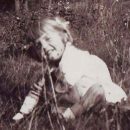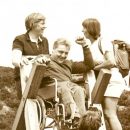World War Two
Ronald Leedham: War starts
Ronald Leedham was born in 1929 in India. His family moved back to England in 1931after Ronald contracted Polio. Ronald spent some years in Hospital as a young child after contracting Diptheria. When he was six he returned home to Catford for a short while to live with his father, eventually ending up living in ‘homes for crippled children’ run by the Shaftesbury Society, until he was sixteen.
More from
Ronald Leedham
- Lead Soldiers
- Beatings
- Geography
- Shut Away and Tipped Out
- Difficult subject
- I Knew Nothing About Life
- Boys and girls together
- Cricket at Sevenoaks
- Visits
- Dogfight
- Suitcases
- Oliver Twist and donk
- Certificates
- Mum
- Home
- Shame
- No talking
- Awful Sundays
- Parlour Songs
- Greyness
- The Walk to Church on Sunday
- Sheltering in the Church
- Visiting every six weeks
- Shelter
- A Miserable Time
- Explosives
- Buzz Bombs and Doodlebugs
- ‘Mummy coming’
- The Glow over London
- Oliver Twist
- Incendiaries in the park
Here Ron remembers the school’s preparation for air attacks.
Transcript
I was eight, nine, when the war started. We were told there was a war on, we were going to fight the Germans because the caretaker of the home, him and his wife, well he had been in the navy in the first war. We used to call them mum and dad cos they were so nice. So he told us, 'Oh we’re going to war, we’re going to fight the Germans again' and this, that and the other and so, especially the boys, you know, wey hey, we’re away.Because we were close to Biggin Hill there were always a lot of aircraft around anyway. We didn’t know they were our air force, we thought they were police planes, Spitfires and Hurricanes and the big ones were for RAF but the small ones were police planes. But anyway, we were always interested in these, you’d see these squadrons flying around, all above us. And then when the war started, after Dunkirk and they really stepped up the fun and games with the Luftwaffe and I can remember the school was prepared for trouble, there’s no doubt about that because it was a lovely old house, absolutely beautiful, by far the best looking house I’ve ever been in. The grounds were smashing, beautiful trees again. I was lucky like that when I was a kid, they were all good, big, well established country houses and country gardens, they were lovely.
But anyway they had big windows obviously, as they used to in those days and they had sandbags all the way up the windows. You could hardly see, they left a space at the top to let air and light in but all the rest of it was sandbagged up, thousands and thousands of sandbags. When there was an air raid of any description, we all had to go into one of the downstairs rooms, which was the... it wasn’t the school room, oh it was our play room, that was it and we all had to go in there, all the staff had to go in there, the domestic staff, nursing staff and all the children, 25 boys, 25 girls, we all had to go into this one room and if there was a raid on in the night, somehow we all had to go and sleep in that room as well. We didn’t have many air raids as such those days, it was all fighter attacks and I can remember when the attacked Biggin Hill, they had a little bash at it for about five days I think. And I can remember us all in this play room, looking through the amount of window that we had left over the thing and we could see all the battle going on up there, you know.
God, the staff were absolutely terrified. Crying, huddled down, you know, getting the kids under them and there was us boys looking up, couldn’t believe our luck. And there were..Messerschmitts and Spitfires and Hurricanes chasing each other all over the place and guns banging away and oh dear, terrific racket going on. But, you know, we all survived that and we always hoped that it’s go on and on and on cos we enjoyed it.
Explore more
Explore stories by theme or view the timeline of significant events in education for disabled people
![How Was School? [logo]](https://howwasschool.allfie.org.uk/wp-content/themes/hws-base-theme/assets/img/allfie-logo-original.svg)



